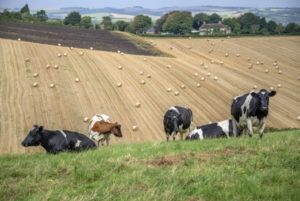 A new report published today by the Sustainable Food Trust to mark World Soil Day, explains why soil degradation is increasing and calls for it to be recognised alongside climate change, as one of the most pressing problems facing humanity.
A new report published today by the Sustainable Food Trust to mark World Soil Day, explains why soil degradation is increasing and calls for it to be recognised alongside climate change, as one of the most pressing problems facing humanity.
Soil degradation costs up to £7 trillion a year and poses a grave long-term threat to food security and the environment. It reduces the ability of farmland to produce food at a time when more will be demanded of soils than ever before due to population increase and climate change.
More than 95% of the food we eat depends on soil, but half (52%) of all farmland soils worldwide are already degraded, largely due to inappropriate farming methods.
Every year, 24 billion tonnes of soil is irrevocably lost to the world’s oceans due to wind and water erosion – that’s equivalent to 3.4 tonnes for every person on the planet or a 12 tonne lorry load for an average UK family of two parents and 1.7 children.
SFT policy director, Richard Young said, “Few people think about soil when they do their shopping, in part because most root vegetables have all the soil washed off them these days, but the reality is that for every trolley of food we wheel back to our cars, we are tipping three trolleys full of the same weight of soil into the river to be washed away.
“With continuing population growth and the relentless march of climate change, we need soils to produce higher yields in the years to come, yet they are in a more depleted state than at any time in human history. Urgent action is now needed to develop common solutions which address climate change and soil degradation simultaneously”.
The problem, however, may be even worse than these figures suggest. In addition to the loss of soil itself, much of the soil that remains in the fields is losing organic matter. Organic matter is largely made up of carbon and nitrogen and these elements are being lost from soils as the greenhouse gases carbon dioxide and nitrous oxide, which increase global warming.
Soils with low levels of organic matter lack the ability to produce maximum crop yields, retain moisture during dry times or produce crops that resist pests and diseases. They are also unable to stand up to the physical impact of heavy rain, flooding and farm machinery.

